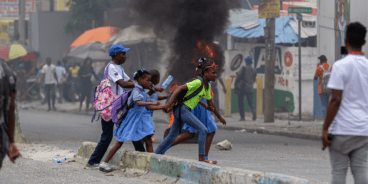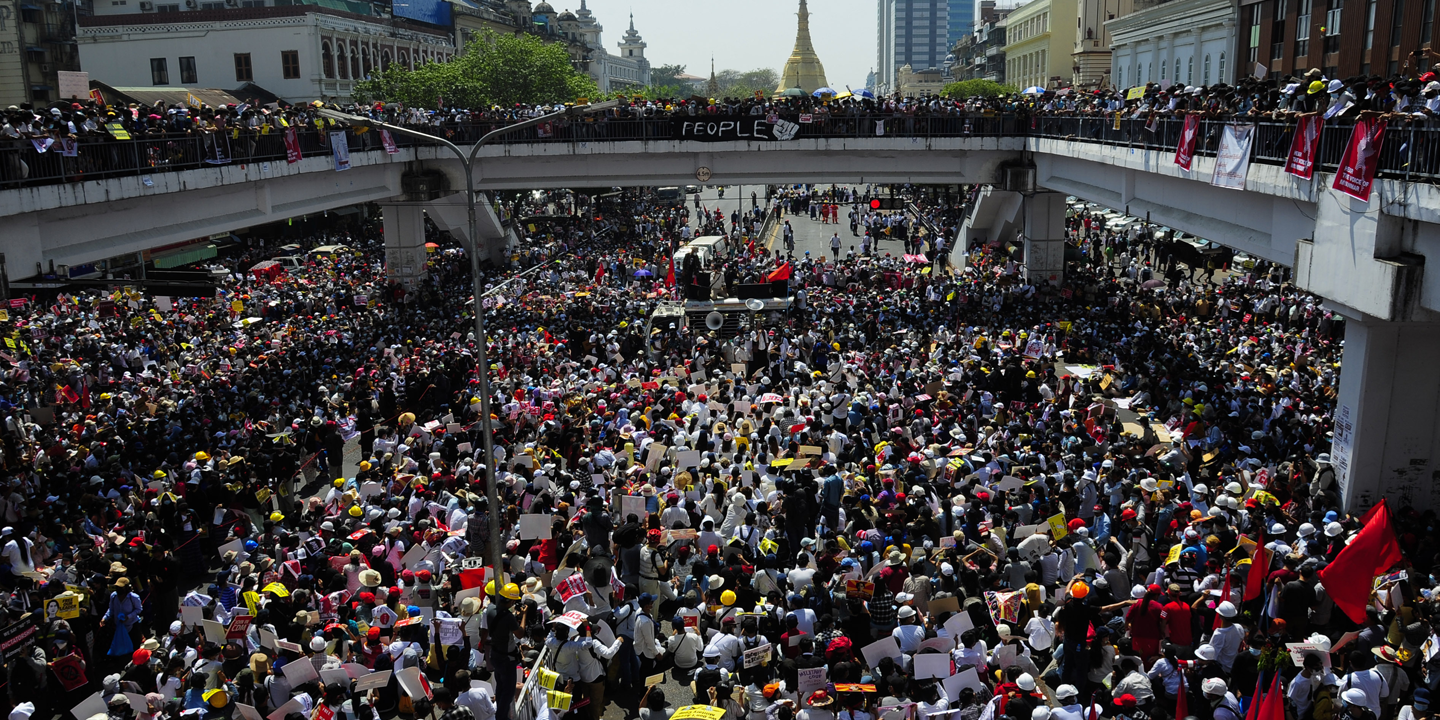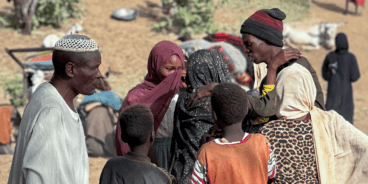

Atrocity Alert No. 240: Myanmar (Burma), Democratic Republic of the Congo and Cameroon
Atrocity Alert is a weekly publication by the Global Centre for the Responsibility to Protect highlighting situations where populations are at risk of, or are enduring, mass atrocity crimes.
Myanmar’s military uses lethal force against protesters
The threat of atrocities continues to increase in Myanmar following the 1 February military coup. On 9 February a 19-year-old protester, Mya Thwe Thwe Khaing, was fatally wounded when she was shot in the head by security forces in Naypyidaw. Meanwhile hundreds of thousands of people continue to participate in daily strikes and protests against the state of emergency declared by the military, with the security forces using tear gas, water cannon, rubber bullets and live ammunition in their attempts to suppress demonstrations. Overnight raids on the homes of activists, as well as beatings and arrests, have been widely reported and armored vehicles are now deployed in all major cities.
According to the Assistance Association for Political Prisoners, 495 pro-democracy politicians, political activists or protesters have been detained since 1 February. The vast majority of detainees are being held without charge.
On 10 February the UN Special Rapporteur on the situation of human rights in Myanmar, Tom Andrews, warned that all “officers, regardless of rank, can be held criminally liable for international crimes, including crimes against humanity involving killing, enforced disappearances, arbitrary detentions and torture.” The UN Human Rights Council (HRC) held a Special Session on 12 February on the Myanmar crisis and adopted a resolution urging the security forces “to exercise utmost restraint” towards peaceful protests. On 16 February Special Rapporteur Andrews sounded alarm as protests continued, stressing, “I am terrified that given the confluence of these two developments – planned mass protests and troops converging – we could be on the precipice of the military committing even greater crimes against the people of Myanmar.”
In 2018 the HRC-mandated Fact-Finding Mission on Myanmar concluded that senior members of the military, including the leader of the 1 February coup – General Min Aung Hlaing – should be prosecuted for genocide committed against the Rohingya, as well as for crimes against humanity and war crimes perpetrated in Kachin, Rakhine and Shan states. “With the same military officers now in charge of the country, the potential threat of atrocities being perpetrated against the civilian population is extremely high,” said Nadira Kourt, Program Manager at the Global Centre for the Responsibility to Protect.
The UN Security Council should urgently impose a comprehensive arms embargo on Myanmar, as well as targeted sanctions on General Min Aung Hlaing and the other coup leaders. All UN member states and foreign companies should immediately divest from all businesses linked to Myanmar’s military rulers, including the military-controlled conglomerates Myanmar Economic Holdings and Myanmar Economic Corporation.
Crimes against humanity continue in eastern DRC
On 14 February suspected members of the Allied Democratic Forces (ADF) armed group raided the village of Ndalya in the Democratic Republic of the Congo’s (DRC) Ituri province, killing 13 civilians and burning down a local church. The following day suspected ADF fighters killed 10 villagers in Kalembo, Beni territory, in neighboring North Kivu province. According to the Kivu Security Tracker, this was the third major attack perpetrated by the ADF in Beni since the start of February, with nighttime attacks claiming the lives of 14 people in Mabule on 5 February and 10 people in Kabembeu on 8 February.
According to a 2 February report by the UN Joint Human Rights Office in the DRC, at least 849 civilians were killed by the ADF in Ituri and North Kivu provinces during 2020 and a further 534 were kidnapped. Local security forces also perpetrated violations of International Human Rights Law (IHRL) and International Humanitarian Law (IHL) while battling the ADF. The Office of the UN High Commissioner for Human Rights noted that, “given the widespread and systematic nature of the attack directed against the civilian population, some of the documented human rights abuses may amount to crimes against humanity.”
On 16 February the UN Refugee Agency (UNHCR) also raised alarm at “ongoing atrocities carried out by armed groups in eastern [DRC], which have become part of a systematic pattern to disrupt civilians’ lives, instill fear and create havoc.” According to UNHCR, between December 2020 and January 2021 alone, armed groups committed at least seven incursions into five sites for displaced populations in North Kivu. Some armed groups, including the ADF, have also forcibly occupied schools and attacked health centers throughout North Kivu.
The DRC government and MONUSCO (the UN peacekeeping mission) must ensure that protecting civilians remains their primary priority as they address the ongoing threat posed by the ADF and other armed groups. The DRC government must also hold all perpetrators of crimes against humanity and other violations of IHL and IHRL accountable, including those from within their own security forces.
Video reveals torture by Cameroonian security forces
On Monday, 15 February, the Ministry of Defense in Cameroon announced it had detained eight soldiers following the emergence of a video showing security forces torturing a young male suspected of ties to an armed separatist group. The video, which was shared widely on social media last Sunday, shows soldiers in Ndu, in the English-speaking north-west region, beating the young man with a machete until he loses consciousness.
This latest incident is part of a catalogue of abuses perpetrated by government forces as part of their military campaign against armed separatist groups. While the arrest of the eight soldiers is a positive step towards accountability, there has been widespread impunity for atrocities perpetrated in the Anglophone regions.
Since 2016 conflict over cultural rights and marginalization in Cameroon’s Anglophone regions has resulted in at least 3,000 civilians being killed and more than 750,000 displaced. Clashes between government forces and armed separatist groups have resulted in atrocities against the civilian population, including extrajudicial killings, kidnappings and torture. It has also resulted in the widespread destruction of villages, schools and hospitals throughout the north-west and south-west regions. Both sides of the conflict have been accused of grave violations and abuses of human rights.
Despite the magnitude of the crisis in Cameroon, the African Union (AU) and UN Security Council (UNSC) have largely ignored the armed conflict. Earlier this month Cardinal Pietro Parolin, Secretary of State of the Vatican, visited Cameroon and announced the Catholic Church’s readiness to facilitate a dialogue between the government and Anglophone separatist groups.
Juliette Paauwe, Senior Research Analyst at the Global Centre for the Responsibility to Protect, said that, “it is significant that a growing number of states are condemning the ongoing violence in Cameroon. But now is the time to move from words to action and to use trade agreements and military assistance programs as leverage to ensure that the human rights of all Cameroonians are equally protected.” The UNSC and AU should support attempts by the Vatican to mediate a comprehensive ceasefire in the Anglophone regions.
Related Content


Atrocity Alert No. 435: Sudan, Israel and the Occupied Palestinian Territory and Democratic Republic of the Congo
